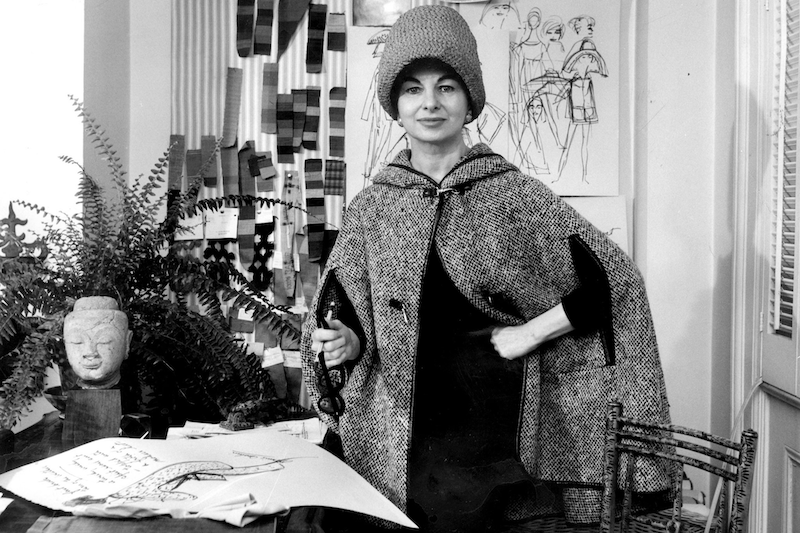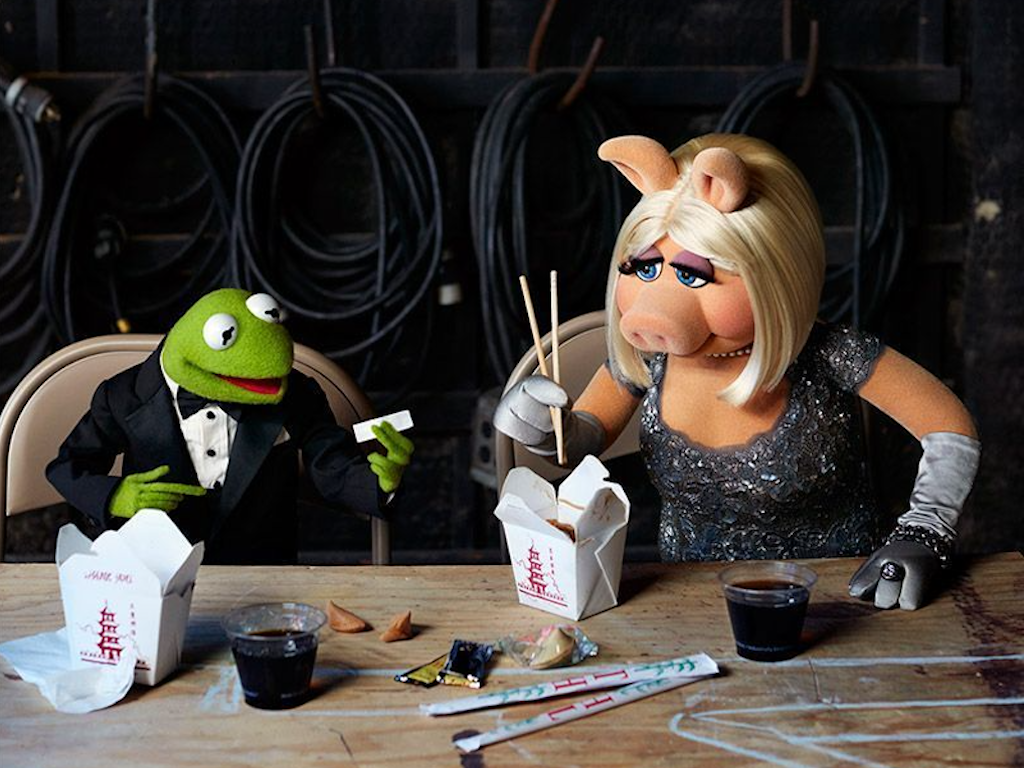My foster cat is still kitten-less and getting bolder by the day. She has made some truly insane leaps for a gal holding 70% of her body weight in her lower half. I'm including a photo because I can't help myself, but it is unauthorized and I will be punished.
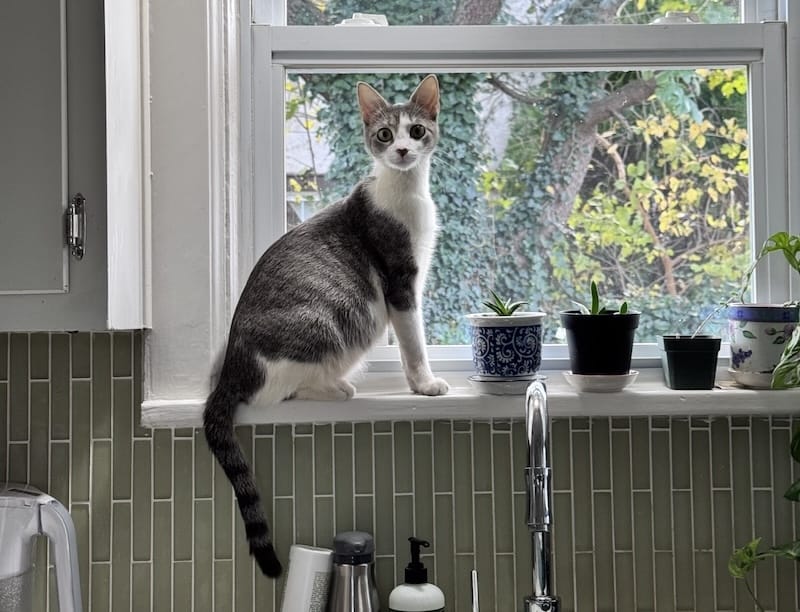
It's been colder here lately, in the 40s and 50s, and gloomy in a way that mostly suits my mood. I'm one of those people who actually really enjoys winter, but I hate Christmas and do much better mentally once it's over. You know that episode of "Gilmore Girls" where Lorelai is on the outs with her parents and doesn't get invited to their Christmas party? That's how I feel the entire month of December and even though I'm not there now, I can feel myself inching toward desperation meals of ranch dressing poured into a bag of lettuce as XTC's "Thanks for Christmas" plays in the background. I try to stave off the depression until Thanksgiving leftovers are gone, so I'll save the rest of my sad sack nonsense for when the calendar flips.
This week, I saw a bunch of movies, including "Peter Hujar's Day," which is as boring as the trailer makes it look. It pains me to say this because I love Ben Whishaw and Rebecca Hall, but I don't understand who that movie is for. There is no person on the planet whose days are worth recounting in that level of detail for 75 minutes. It should have been a video installation at a contemporary art museum, not a feature-length movie. There were two other people in my screening and as the credits rolled, we all looked at each other like, "hmm." Read on for a list of things that elicited a more positive reaction.
I need to see this movie 4-5 more times before I have anything truly intelligent to say about it, so what you're getting here is just my first watch emotional gobbledegook. What I can tell you is that I loved it; it might be my favorite Joachim Trier; and, while the year is not over, I'll be shocked if it isn't my top film of 2025.
"Sentimental Value" is about two sisters, Nora (Renate Reinsve) and Agnes (Inga Ibsdotter Lilleaas), who reunite with their estranged filmmaker father, Gustav (Stellan Skarsgård), after their therapist mother's death. Gustav and their mother divorced when they were young and you get the sense that he was the type of dad who would swoop in when it suited him, make them feel temporarily special, and then disappear. The relationship with their mother isn't as clearly defined, but there's plenty to read between the lines. As adults, Nora is more outwardly damaged than Agnes, who is happily married and has a young son. As an actress for Oslo’s National Theater, Nora has a successful career, but she suffers from tremendous stage fright and has no meaningful personal life. When Gustav writes a new screenplay with her in mind, she promptly turns him down, and he casts American actress Rachel Kemp (Elle Fanning) in the role.
The rest of the film is about Gustav's production — which heavily pulls from his family's past and present — and the way Nora and Agnes manage their relationship with him and each other. If you've seen Trier's other films, you know that stories about generational trauma, parentification, and complex family systems are very much in his (along with co-writer/longtime collaborator, Eskil Vogt) wheelhouse. I like "Sentimental Value" so much because it feels like the perfect culmination of his work. All the ideas he's been grappling with over the course of his career are laid bare and distilled down to their essence. There are several moments that made me cry. In one of them, Agnes's husband recounts a moment when his son looked at him and said, "I see you." This entire film felt like Trier saying the same thing to me, to anyone who has dealt with difficult family relationships in adulthood and longed, more than anything, to be seen.

Watch if you like: "Fleabag," Ingmar Bergman, Karl Ove Knausgård, "Adult Children of Emotionally Immature Parents," crying in therapy, trying to find a medication to fix your problems and giving up when you realize they all come with debilitating side effects.
Of relevance: my 2022 interview with Reinsve on "The Worst Person in the World," Alex's TIFF podcast on "Sentimental Value."
I don't have a ton to say about this one, I just want you to take in the peaceful vibes, low-fi production value, and raccoon playing the harmonica. The YouTube algorithm hasn't recommended anything good to me in a solid decade, so I must celebrate this small win. I don't know much about Meels, but she's on tour right now and I will be seeing her with the Nitty Gritty Dirt Band in April.
Everything about this is good.
This film is a delightful screwball for the 50+ set with a core cast of James Earl Jones, Lynn Redgrave, and Margot Kidder. Mrs. Muldroone (Kidder) runs a boarding house that Poinsettia (Redgrave) and Fish (Jones) move into. All three characters are lonely, dealing with the loss of spouses, and deeply in need of community, which they find in each other by the film's end. If played straight, the story would have been completely depressing, but everyone involved understands how to make sad shit funny. Poinsettia believes she's in a relationship with the ghost of Giacomo Puccini, who sometimes dicks her down multiple times per night. She spends the early part of the film listening to opera, getting drunk, and smoking cigarettes in the bathtub. Her neighbor, Fish, builds Noah's Ark out of burnt matches and engages in frequent wrestling matches with a demon named Hank (also, obviously, invisible). Mrs. Muldroone, who initially seems inconsequential to the story, proves herself indispensable as an empathetic observer who accepts people as they are sans judgment.
The story behind this movie is deeply upsetting and I can't believe we were robbed of its magic for decades — it wasn't released until this year — because Todd McCarthy, noted fuckstick, tore it to shreds in Variety. As a critic, I am a firm believer in saying how you feel with minimal filter, but there are certain responsibilities that come with the power of writing for a big publication, especially when your subject is an independent film you can easily kill (along with several careers) with a few harsh words. As fun as it is to be unabashedly nasty, save that ire for those who deserve it, e.g., misogynists, racists, transphobes, Republicans, etc. And oh, maybe don't make comments like this:
Redgrave [...] is utterly embarrassing, and Burnett has done her no favors by repeatedly cutting to closeups of her in frumpy get-up, fright-wig hair and runny makeup, often screeching or crying.
I hope Redgrave's ghost haunts his ass with Kidder, who he describes as "startlingly aged." This is why so many actresses succumb to weird plastic surgery.
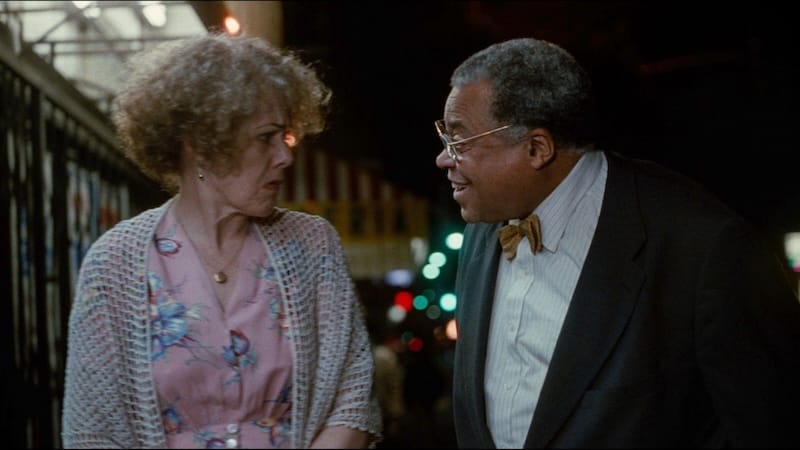
Watch if you like: "Living Out Loud," "Amelie," low-budget screwballs, eccentric retirees, dreaming of a world where people are warm/understanding and just want to help each other survive.
Amina Cain is one of those authors you either fuck with or don't. A review on Goodreads states, "I don't get it. This book read like somebody took all their writing practice prompts, stapled them together, and decided it was good enough to publish." I get where this person is coming from, especially if they read this book over the course of several days. If you don't read this book in one sitting, you miss out on the magical spell of the prose, lulling you into some weird dream state where you're standing on the edge of a mountain, looking down at rolling fog, thinking about all the inexplicably meaningful moments in your life and trying to decipher why they fit into this category. To me, "Creature" — much like Cain's newer book, "A Horse at Night" (2022) — is about reading, writing, and the solitude it takes to accomplish both. It's about people who live life in their minds more than out in the world.
At 127 pocket-size pages long, the book is split into fourteen stories about slice of life occurrences. You're dropped into them without any preamble and left to piece together their meaning. Sometimes they directly connect ("Queen" and "The Beak of a Bird"), but often the connection is more tenuous. All the stories are written in first person, from the perspective of women, frequently writers, the type who have seen some shit and come out the other side a bit shell-shocked. They are all held at a significant removal. We know only what they wish to tell us, which is not much. Some readers might find them hollow, but I found them enticing and enjoyed the process of trying to suss out their relationships, worldviews, and preoccupations. I liked this book less than "A Horse at Night," but I still heartily recommend it for anyone who wishes to slip away to an alternate dimension in the insomniac early morning hours.
Before I left the last city I lived in, all my friends had already moved. I went to a party and in the bathroom I thought to myself, when you walk back out none of the people you love will be there. One friend is too much in her body, and was one of the people I missed most in that bathroom, feeling how far away she was, that I wouldn't go with her to parties in that city anymore. Another friend and I used to remind each other that someday this moment would be over, a continuous recognition, grateful to still be immersed in it.
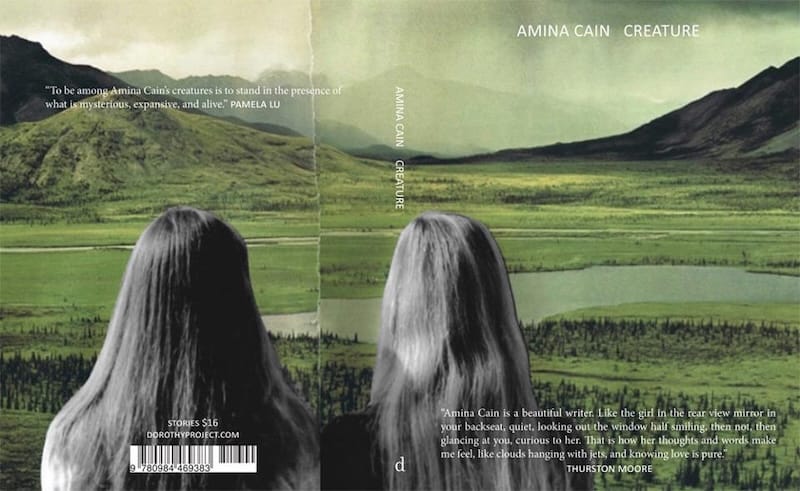
Read if you like: Lydia Davis, Claire-Louise Bennett, Leonora Carrington, Body/Head, stoned solo hikes, processing life in the bathtub.
Here are some recommendations for people who like fashion, film, and design. They probably still subscribe to at least a handful of magazines and miss the days when Pinterest boards were tactile collages. This list also works for any impressionable teens in your life who could use some direction from a real person, not some jagoff hawking garbage on TikTok.
- Stephanie Lake's "Bonnie Cashin: Chic Is Where You Find It" (2016). Bonnie Cashin is one of those unsung fashion designers who influenced many big names (Donna Karen, Calvin Klein), pioneered American sportswear, made beautiful costumes for the ballet, Hollywood and the theater, and yet gets largely ignored in the annals of fashion history. This book is written by her archivist/heir, Stephanie Lake (and the story behind how that happened is the stuff of dreams). It's worth buying for the photos alone, which contain sketches you won't see anywhere else.
- A subscription to a book club like NYRB, New Directions, Deep Vellum, Two Lines, or Archipelago. This is perfect for someone who wants to read more but suffers from decision paralysis. Even if the picks aren't to the recipient's taste, they will always be interesting/worthwhile. In a similar vein, I also love Tandem's coffee & vinyl subscription, which I've been getting for a few years now. This Portland Maine cafe (with a legendary breakfast sandwich) has introduced me to so much good music that I wouldn't have otherwise discovered, and the coffee is similarly excellent.
- A framed print from an artist you think they'd like. Here are some of my favorites: Janet Hill, Jane Dashley (she'll have prints for sale next week), Lee Price, anything from Toi Gallery, Studio After Cigs, and Isabelle Feilu. Check out the auctions in your area, too. I've gotten paintings for myself and others for practically nothing by stalking Live Auctioneers and Bid Next Door. Estate sales are obviously great, too.
